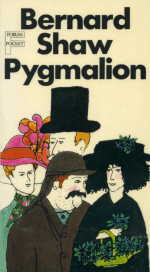Characterization and Symbols
Henry Higgins is an unconventional, amoral professor of phonetics who represents Pygmalion to Eliza's Galatea. He seems to be a child in an adult's body. Higgins has no moral standards or restraints and is indifferent to questions of right and wrong. He does not see a distinction between appearance and reality and does not see the importance behind feelings over appearances. Irony exists in the fact that Higgins is refining Eliza, but his manners are no more polished than hers are, even after having been exposed to an education. Society, however, views Higgins as a gentleman despite his offensive outbursts and abominable manners, which is Shaw's way of criticizing society. In society's eyes, the professor's wealth and ability to speak well define him more than do his stirring actions. Higgins is a symbol of Pygmalion, who falls in love with the ivory statue he has carved in the Greek myth, even though he is not fond of women. Although it is not explicitly stated that Higgins acquires feelings for Eliza, it is a possibility.
Eliza, a flower girl with an unrefined dialect, is transformed (at least in society's eyes) into an acceptable woman by Higgins. Eliza realizes that appearance is not everything and knows that after being physically changed, she is still just a flower girl. The girl's real transformation occurs not when Higgins refines her, but when she asserts her own dignity against Higgins's uncaring nature. He does not treat her with the respect she desires and deserves, and she becomes a mature, liberated woman as she makes her statement. Eliza is a symbol for the statue, Galatea, in the Greek myth. She is shaped and refined, as is the statue. Her appearance consisting of her clothes and jewelry represents the shallow nature of love that Shaw believes in.
Alfred Doolittle, a drunk, is Eliza's father. He is not an admirable character, can be considered a scoundrel, and sells Eliza to make a few pounds. He is changed from a dustman to a middle class citizen, but this transformation does not result in his ultimate happiness.
Mrs. Higgins, Henry's mother, mediates some of the conflicts between Eliza and Higgins. She sees her son's plan as pure stupidity.

Henry Higgins is an unconventional, amoral professor of phonetics who represents Pygmalion to Eliza's Galatea. He seems to be a child in an adult's body. Higgins has no moral standards or restraints and is indifferent to questions of right and wrong. He does not see a distinction between appearance and reality and does not see the importance behind feelings over appearances. Irony exists in the fact that Higgins is refining Eliza, but his manners are no more polished than hers are, even after having been exposed to an education. Society, however, views Higgins as a gentleman despite his offensive outbursts and abominable manners, which is Shaw's way of criticizing society. In society's eyes, the professor's wealth and ability to speak well define him more than do his stirring actions. Higgins is a symbol of Pygmalion, who falls in love with the ivory statue he has carved in the Greek myth, even though he is not fond of women. Although it is not explicitly stated that Higgins acquires feelings for Eliza, it is a possibility.
Eliza, a flower girl with an unrefined dialect, is transformed (at least in society's eyes) into an acceptable woman by Higgins. Eliza realizes that appearance is not everything and knows that after being physically changed, she is still just a flower girl. The girl's real transformation occurs not when Higgins refines her, but when she asserts her own dignity against Higgins's uncaring nature. He does not treat her with the respect she desires and deserves, and she becomes a mature, liberated woman as she makes her statement. Eliza is a symbol for the statue, Galatea, in the Greek myth. She is shaped and refined, as is the statue. Her appearance consisting of her clothes and jewelry represents the shallow nature of love that Shaw believes in.
Alfred Doolittle, a drunk, is Eliza's father. He is not an admirable character, can be considered a scoundrel, and sells Eliza to make a few pounds. He is changed from a dustman to a middle class citizen, but this transformation does not result in his ultimate happiness.
Mrs. Higgins, Henry's mother, mediates some of the conflicts between Eliza and Higgins. She sees her son's plan as pure stupidity.

0 Comments:
Post a Comment
<< Home